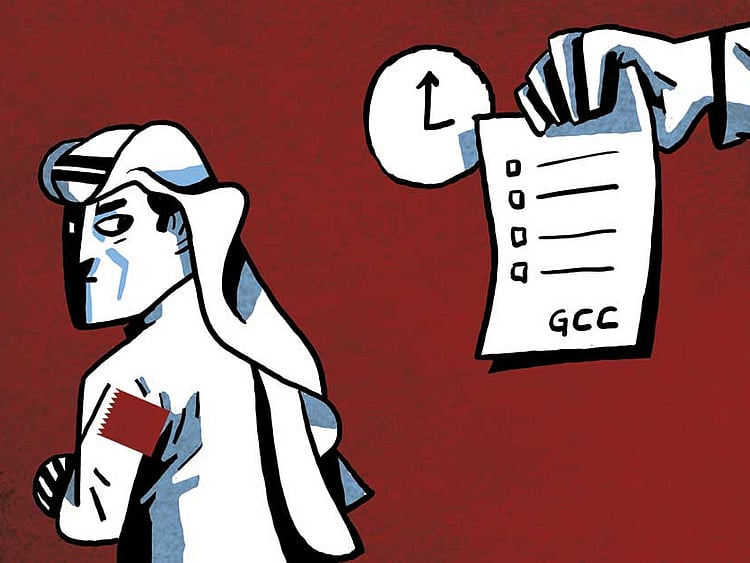Also In This Package
Dubai: Days after the Gulf Cooperation Council (GCC) held its 39th summit in Riyadh, the surge of optimism that came with the invitation to Qatar’s Emir Shaikh Tamim Bin Hamad Al Thani to attend, and the call by Kuwait’s Emir Shaikh Sabah Al Ahmad to end the acrimonious media campaign that threatened the unity of the alliance has faded.
The Qatari emir kept away from the Saudi capital and sent his deputy foreign minister while the verbal attacks and accusations continued.
The leaders of the GCC countries — Bahrain, Kuwait, Oman, Qatar, Saudi Arabia and the United Arab Emirates — hold an annual meeting usually in December in one of their capitals on a rotating basis.
On June 5 last year, Bahrain, Saudi Arabia and the UAE severed their diplomatic, trade and travel relations with Qatar after they accused it of supporting extremists and of failing to commit to the common GCC principles. The three countries and Egypt which took the same boycott stance issued a list of 13 demands and wanted Qatar to comply.
Also Read
Qatar will not rock any boat with its Opec exitQatar’s exit will not implode GCCBahrain criticises Qatar emir for not attending GCC summit in RiyadhHowever, Doha dismissed the charges and refused the demands.
Mediation efforts, led by Kuwait, to bridge the gap between the two sides have so far failed to achieve the slightest increment.
“How can we expect the Kuwaiti mediation to succeed in convincing Saudi Arabia, the UAE and Bahrain that it can create a propitious atmosphere for dialogue and that Qatar is keen on removing obstacles to dialogue when the Qatari government does not order an end to the media campaigns and when ministers use Western and local platforms to attack Riyadh or be openly complicit in accusations against Saudi leaders?” Abdul Aziz Omar, a Saudi media figure, wondered.
Hamad Al Amer, a Bahraini analyst, said that the situation in the Arab world in general and in the Gulf in particular has degenerated to its worst levels in modern history, resulting in fragmentation, disintegration and losses.
“The brotherly Gulf relations have shifted from the stage of discreet disagreements behind public smiles and compliments to the phase of open rupture. Nobody could have ever imagined that such a shift would occur and as dramatic events unfolded, hope for confidence-building measures between the Gulf parties has been replaced with bitter disappointment,” he said.
Al Amer, the former undersecretary for Gulf affairs at Bahrain’s foreign ministry, said that several reasons had contributed to the new situation.
“Qatar sought to coordinate with the previous US administration and before the launch of the so-called Arab Spring revolutions to maximise its regional role by financing and supporting groups with agendas to topple the regimes in Gulf and Arab countries."
Adding "It used its rotating presidency of the Arab League Council to achieve the coup d’état plans in accordance with its interests in the region. It supported the Muslim Brotherhood in Egypt and presented itself as a strong ally of the West, particularly the administration of former President Barack Obama.”
Al Amer argued that Qatar opted to consolidate its political, security and military relations with Iran despite the rift between Tehran and GCC capitals.
“Qatar has apprehensions from Saudi Arabia, the UAE and Bahrain and, as a result, it sought to secure its narrow interests by signing several agreements with Iran, including the security cooperation agreement in 2010 that included mutual defence against threats to either party.
The 2015 agreement stipulated joint military exercises and the protection of borders through cooperation between the Qatari army and the Iranian Revolutionary Guard. Qatar has repeatedly said that Iran was part of the solution, not of the problem.”
For Iran, closer political, security and economic ties with Qatar meant self-serving advantages and the pursuit of its foreign policy based on deepening Saudi-Qatari differences with a view to establishing a foothold in the Gulf region to realise the principles of the Khomeini revolution, Al Amer said.
“Iran wanted to strengthen its hegemony as the leading regional power that dominates the region, especially after signing the nuclear agreement with the West (5 + 1) in July 2015, which was considered by the previous US administration the key to security and stability in the Arab region. The nuclear deal gave Iran the green light to consolidate its regional presence at the expense of Saudi Arabia.”
Al Amer said that the solution to the crisis was for Qatar to comply with the 13 demands issued last year.
“These demands were not new. They were part of the 2013 and 2014 Riyadh agreements signed by the GCC leaders, including Qatar’s Emir Shaikh Tamim. Thus, there is a moral obligation for Qatar to implement its provisions aimed at finding a radical solution to the problems resulting from Doha’s unacceptable and irresponsible actions that seriously jeopardise the security and stability of the Gulf states. These states are targeted by the acts sabotage and public disorder perpetrated by terrorist individuals and organisations based in Doha or backed by Qatar as part of its plan to change regimes in the Gulf states,” he said.
For Al Amer, Qatar which believes that the 13 demands are a violation of its national sovereignty, unacceptable dictates and interference in its internal affairs, should “recognise the serious damage caused by its policies and plans to the security and stability of the Gulf region and to political regimes” before calling for a dialogue.
“A very crucial first step for any rapprochement is to heed the call by Shaikh Sabah to end malicious media campaigns in order to calm down the situation.”
Sign up for the Daily Briefing
Get the latest news and updates straight to your inbox
Network Links
GN StoreDownload our app
© Al Nisr Publishing LLC 2026. All rights reserved.
